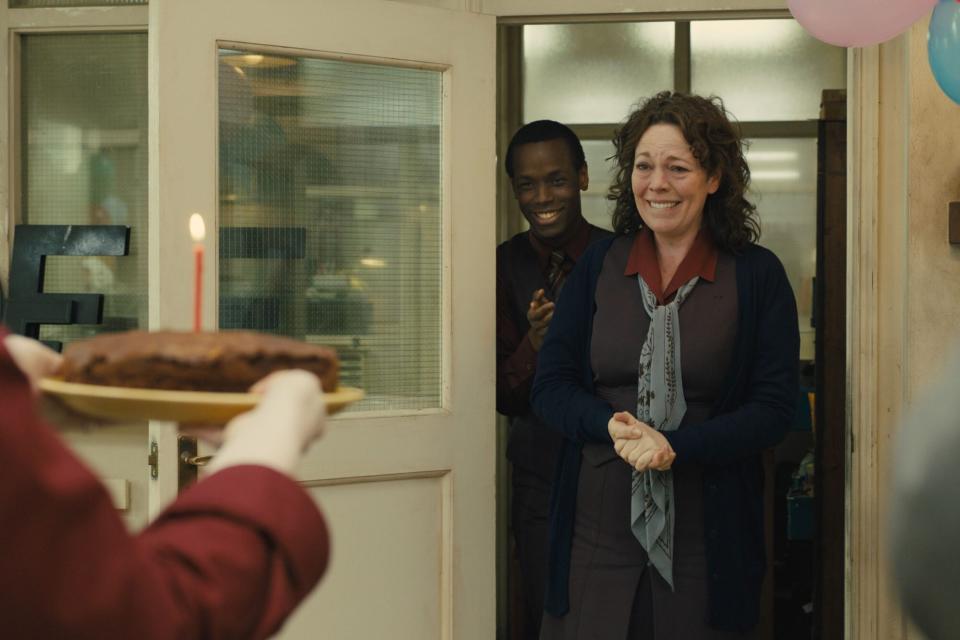Empire of Light review: Olivia Colman shines in Sam Mendes' 1980s ode to cinema
- Oops!Something went wrong.Please try again later.
For nearly as long as there have been movies, there have been love letters to the art of it on screen, from Singin' in the Rain and Cinema Paradiso to La La Land. Sam Mendes' Empire of Light, which premiered yesterday at the Telluride Film Festival, is one of those mash notes: a tender, meandering ode to cinema that also plays as an unlikely romance, a misty snapshot of a bygone era, and an often-incandescent character study. That's in part because Mendes wrote it specifically with his star Olivia Colman — an actress who seems incapable of giving a clumsy or conventional performance — in mind. She's Hilary Small, a woman who works at a seaside cineplex on the south coast of England at the turn of the early 1980s. It's the age of The Blues Brothers and All That Jazz and Sunday matinees, when going to see a film was still a social occasion (albeit one accessible to anyone with £1.50 for a ticket; seniors are 75 pence.)
The grand old Empire, nestled so close to the waterfront that sand and seabirds nearly come up to the front doors, is an only slightly decrepit temple of plush swirly carpets, brass fittings, and attendants in crisp polyester uniforms. Hilary is considerably older than most of her coworkers — aside from a persnickety but kind projectionist played by the great Toby Jones — though she seems just right for the priggish manager, Mr. Ellis (Colin Firth), a man who likes the way she pre-warms his office slippers in the morning and submits to being occasionally bent over his desk for sex. When she's not selling concessions or sweeping up spilled popcorn in the aisles at work, she drinks wine in the bathtub and eats her Christmas dinners for one, waiting for the moments when Mr. Ellis will deign to shine his light her way.

Searchlight Pictures
The arrival of a new hire named Stephen (Lovers Rock's Micheal Ward) hardly seems like the thing to change that; he's too young and brash and handsome to even register some middle-aged lady. But he's also Black in a time and a place where just walking down the street can turn into a gauntlet of spittle-flecked cruelty and physical abuse, and he senses something kindred in Hilary. Soon they become improbable friends and then lovers, though their sexual connection feels more like a manifestation of their mutual loneliness than anything remotely sustainable in the real world.
And it isn't sustainable, of course, particularly when Hilary's deeper issues begin to surface (there's a reason she's on lithium, even though she hates the way it numbs her), and Stephen starts making plans for a life beyond the ticket booth. That, and the rising racial and economic tensions of Thatcher England, bode several darker turns in Mendes' script, though his narrative often plays less like a conventional drama than a memory palace, its rhythms slowed to match the tempos of this sleepy town. In that way, Empire can seem like a minor work for the director of two Bond movies, American Beauty, and one of the most ambitious war films in recent history.
But Colman, her eyes darting between hope and devastation, is so lit-up and specific (and funny, a quality that doesn't seem to get mentioned enough) that she lifts nearly every scene. And the 24-year-old relative newcomer Ward, who looks a little like a young Sidney Poitier, is remarkably warm and grounded in a part that could easily have been swallowed by the Oscar winner playing across from him. The legendary cinematographer Roger Deakins — who last won an Oscar for Mendes' 1917 — gives their beach trips and late-night bus rides a suffused glow, and even in a movie as modest as Empire, Mendes fills out the corners of his story with carefully observed details and eccentric characters, weaving them into a sort of sweetly self-contained whole. We can't live our lives sitting in the dark, he seems to say, but movies can still save us, at least a little bit. Grade: B+
Related content:

